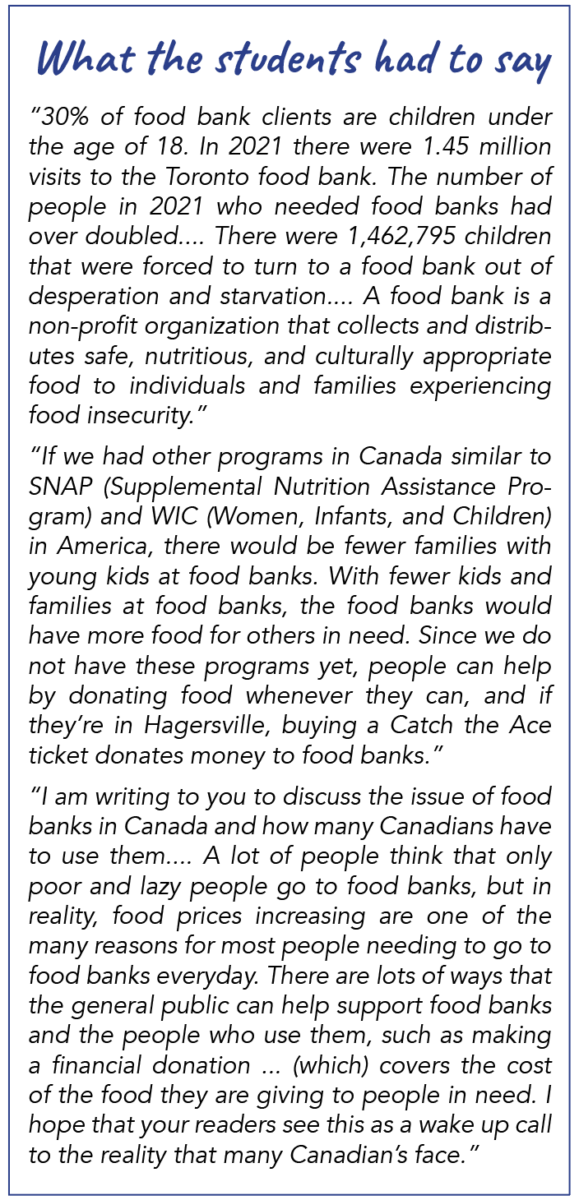By Mike Renzella
The Haldimand Press
HAGERSVILLE—The first email arrived around 11:30 a.m. on a Tuesday – a student in Steven Evans’ Grade 8 classroom at Hagersville Elementary School tasked The Press with encouraging our readers to donate to their local food bank. It was the first of many.
An excerpt reads, “There are lots of people who only get enough to live. We can fix this by donating money or food to food banks, but also it should be a government-funded program. People who need a food bank should get all the supplements they need to feed themselves or their families. You can put it in the newspaper to encourage people to donate to a local food bank.”
Then, in quick succession, several additional emails from other students with a similar message arrived. Impressed with the students’ desire to highlight an important issue, The Press contacted Evans, who has been with the class since January. He said the emails were part of a Financial Literacy exercise from that morning.
He employs various methods in the classroom to teach his students about complex societal issues, with a focus on making concepts relatable for the students. He noted, “We’ve done thought experiments around the question of whether or not the rich should be taxed at a higher rate, gone on scavenger hunts to find the best deals on high quality items that students might want to buy, and done an HST-calculating relay race, among other things. The goal is just to get as many students involved in the lessons and the conversations as possible, regardless of where they are in their numeracy skills.”
Evans added that “the lesson about food banks and food insecurity started with an activity where students would hear statistics about food insecurity in Canada and go to a part of the room depending on how surprised they were by the statistics. They would then talk as groups and share their reasoning behind their reaction to the stat. The hope here is, again, to get students engaged.”
The students did their own research too, which they used as the basis for their letters. Evans added, “We generally try to make lessons work across different strands and subjects in their curriculum so that they can get valuable practice in more than one area.”
Evans said he’s taught students as young as Grade 5 about important economic and social issues facing their communities and the country, with the students then brainstorming to try and come up with practical solutions or ways to support people facing those issues.
“Along with food insecurity, we’ve discussed issues facing people near or below the poverty line, and what social and economic factors might have led to them being in that situation,” said Evans. “We’ve discussed the welfare system and what possible alternatives there are to it, including Universal Basic Income. We’ve also discussed how to set smart short- and long-term financial goals, and how to effectively budget to save for those goals.”
He noted that the responses to class discussions on the subject “run across the whole spectrum.… Many of them were surprised to hear that there are so many people who cannot afford food and felt that it was unfair that the government would allow children to be among those who don’t have enough. While there are certainly students who are familiar with the idea of not having enough, I think the idea of financial difficulty is still an abstract concept for many of them.”

“For now, I think many are just used to the world and environment that they’ve grown up in, and don’t yet understand what it means for a family to rely on food banks or other social services to make ends meet,” he added. “That being said, they are all in the camp of ‘more should be done to alleviate the struggles of those who are less fortunate,’ so that has been encouraging to see.”
The letters themselves spoke to a degree of knowledge that shows Evans’ students have a grasp on the difficult issue, filled with relevant facts on the matter alongside impassioned pleas for the community to do whatever they can to contribute to the cause.
Evans believes this new approach to these concepts in education is helping to prepare modern students for the world they will eventually enter as adults: “I know a lot of people are of the opinion that they were never taught practical skills in schools, like doing taxes or making smart investments, so it should be comforting to know that students are now being taught how to set smart financial goals and work towards them with the tools available, among other financial literacy skills,” he concluded. “Hopefully the new generation is one that is a bit more prepared for life-after-high school than the generations before it, at least in terms of its financial literacy.”





